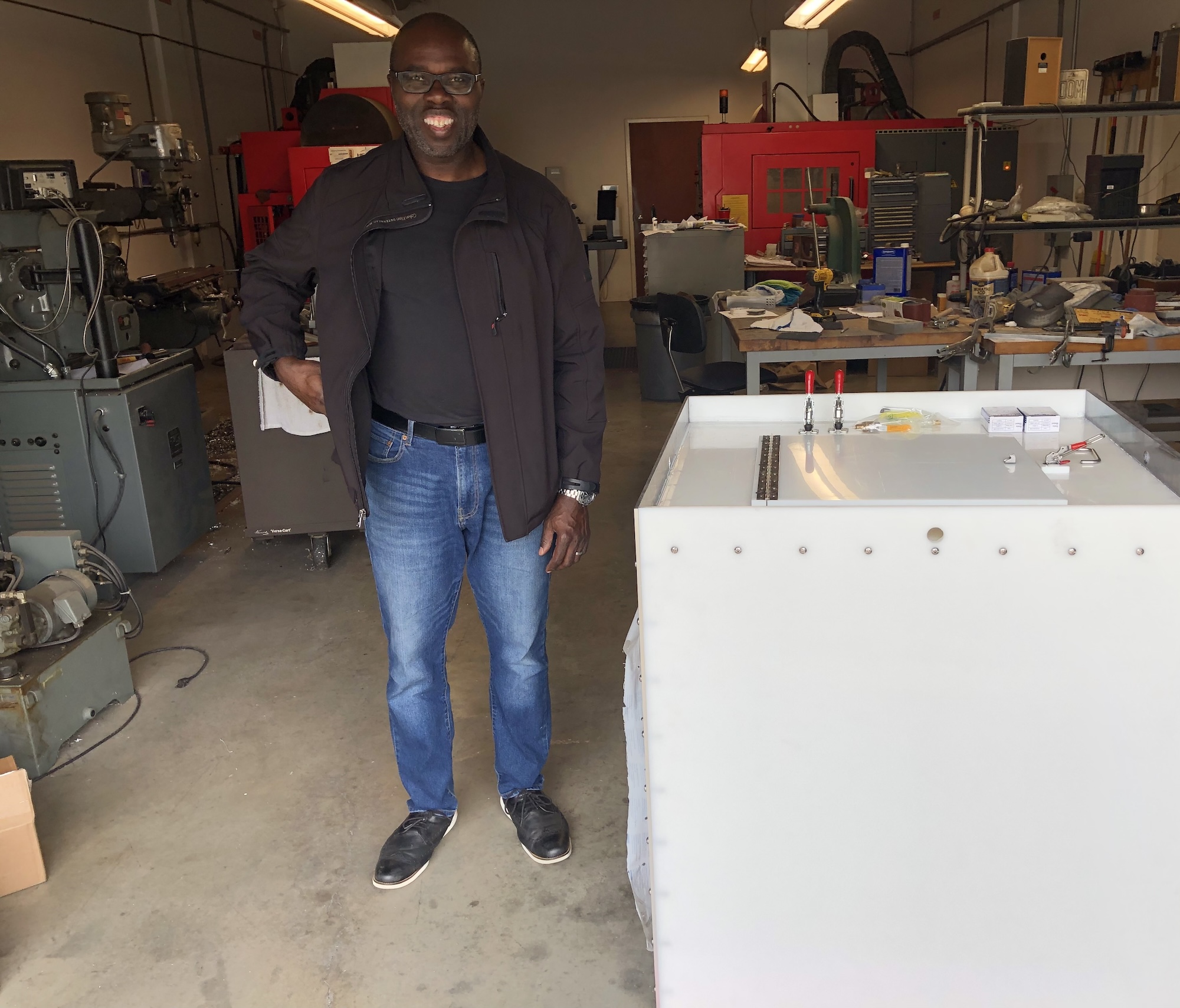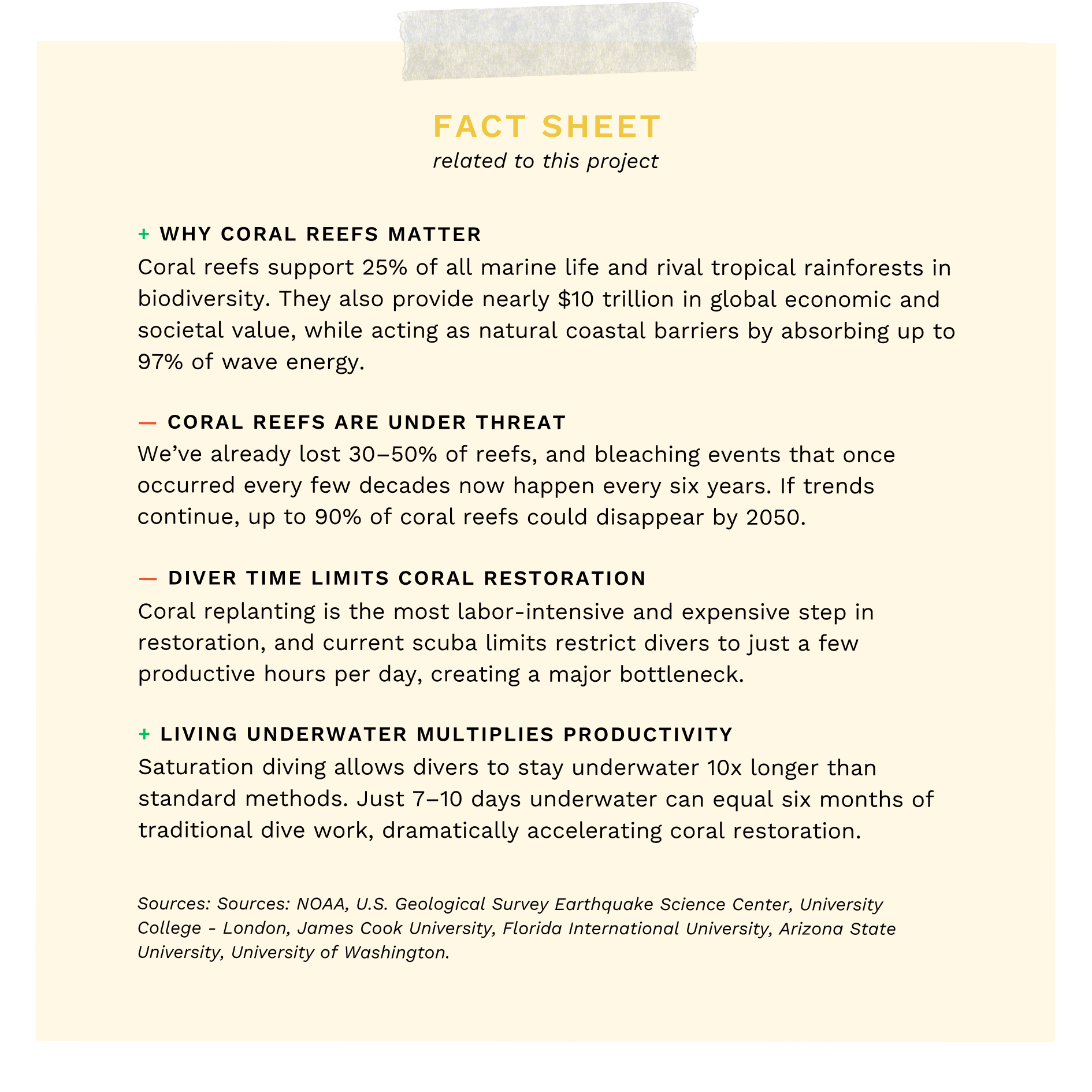climate action project
Developing Underwater Habitats for Sustainable Exploration and Coral Restoration in NC's Shallow Ocean Waters
Launched by ARGONETA in January 2025
ARGONETA’s mission is to transform humanity’s connection with the ocean by creating safe, affordable underwater habitats for recreation, research, and conservation.
The Stardust Startups NC grant has enabled Ivan Francis to hire a law student to tackle regulatory approvals and develop a repeatable approach for market entry.
The habitats will be deployed in shallow ocean waters, accelerating coral restoration efforts and enhancing the role of citizen scientists in marine conservation.
location
Durham, NC
date
December 2024
grant
$3K towards intern for regulatory approvals for 1st habitat


the current situation
The underwater world remains largely inaccessible, limiting opportunities for marine research, coral restoration, and immersive experiences. Traditional scuba diving allows only short dives, and current undersea habitats are costly and impractical. Meanwhile, coral reefs are rapidly deteriorating, and existing restoration methods are too slow, expensive, or difficult to scale. Promising robotics-based solutions are still 10–20 years from viability, leaving an urgent need for innovative, deployable alternatives today.
the solution
ARGONETA’s innovative underwater habitats offer safe, affordable, and accessible spaces for living, working, and exploring beneath the waves. By adapting the proven concept of saturation diving with a cost- and human-centered design, these habitats enable up to 5X more underwater time for divers, removing time limits as a barrier to large-scale coral restoration. This extended access also empowers citizen scientists and non-divers alike, transforming how people engage with and help protect the marine environment.
lasting impact
Here are the benefits of building ARGONETA’s underwater habitats.
coral restoration
Restoring vital reef ecosystems at scale by lowering costs per hectare and accelerating project timelines.
Citizen Science
Empowering citizen scientists with extended underwater access to accelerate marine conservation efforts.
Carbon Sequestration
Enhancing ocean health to boost natural carbon absorption and mitigate climate change impacts.
Eco-Friendly Research
Reducing the environmental footprint of marine exploration by minimizing surface-based operations.
Ocean Awareness
Engaging the public with immersive experiences that inspire action and advocacy for ocean conservation.
Rapid Deployment
Reducing the time needed to replant large sections of coral and enabling deployment within 90 days of regulatory approval.
how it works
Scuba divers will live underwater for up to 14 days in a pressurized “tiny house” equipped with sleeping quarters, a bathroom, a living area, electricity, Wi-Fi, running water, and surface-supplied air. Once a diver remains submerged for over 24 hours, they can safely dive up to 12 hours a day—triple the time allowed with conventional methods.
The habitat serves as a base for full-day restoration work, eliminating the need to return to the surface after each dive. Recreational divers staying for leisure can also volunteer in coral planting or join citizen science projects.
the ARGONETA story
ARGONETA was founded in 2022 by Ivan Francis and Andrew Lamm.

Ivan Francis, M.B.A.
ceo & co-founder

Andrew Lamm, Ph.D
cso & co-founder
2021 - The Spark
ARGONETA’s journey began when diver Ivan Francis came across an article about underwater living. Inspired, he contacted the author, which led to a visit to Jules’ Undersea Lodge and earning his aquanaut certification in June 2021. Around the same time, Ivan reconnected with longtime friend Andrew Lamm, and their shared passion for the ocean and entrepreneurship sparked the idea that would become ARGONETA.
2022 - Founding
In 2022, Ivan and Andrew officially founded ARGONETA. They began the patent process by working with a patent attorney to protect their underwater habitat concept. After submitting sketches and design materials, their first patent was granted within 18 months. As the project evolved, they initiated additional filings to cover other design features, including ARGONETA’s signature panoramic windows—designed to give users a museum-like view of the ocean.
2023 - Present
With patent work underway, the team began exploring deployment sites in the U.S. and Caribbean, where regulatory approval is in progress. Once approved and funded through angel or venture capital, they plan to build and deploy their first habitat, collect scientific data for peer-reviewed publication, and invite both certified and non-certified citizen scientists to participate. ARGONETA aims to partner with marine conservation and coral restoration groups to maximize its environmental impact.
Our support
The $3,000 Stardust Startups microgrant enabled ARGONETA to hire a maritime law student from Dalhousie University to lead regulatory research and develop a repeatable framework for entering new markets. This work—done in collaboration with marine conservation experts and legal authorities—is helping to navigate complex approval processes in the U.S. and the Caribbean.
The grant also funded photorealistic renderings of ARGONETA’s first product, a crucial step in clearly presenting the vision to stakeholders.
Once regulatory approval is secured in a given market, ARGONETA will launch a targeted PR campaign to build awareness and momentum around its impact on coral restoration and citizen science.

